
Maraba Coffee
Encyclopedia
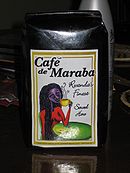
Maraba, Rwanda
Maraba is a region in southern Rwanda. It used to be a district in the Butare Province before a government decentralization programme that re-organized the country's administrative divisions in 2006. It is now part of the Southern Province. The closest major city is Butare.Maraba is most notable...
area of southern Rwanda
Rwanda
Rwanda or , officially the Republic of Rwanda , is a country in central and eastern Africa with a population of approximately 11.4 million . Rwanda is located a few degrees south of the Equator, and is bordered by Uganda, Tanzania, Burundi and the Democratic Republic of the Congo...
.
Maraba's coffee plants are the Bourbon variety
Bourbon coffee
Bourbon coffee is a type of coffee produced from the Bourbon cultivar of the Coffea arabica species of coffee plant. Bourbon coffee was first produced in Réunion, which was known as Île Bourbon before 1789...
of the Coffea arabica
Coffea arabica
Coffea arabica is a species of Coffea originally indigenous to the mountains of Yemen in the Arabian Peninsula, hence its name, and also from the southwestern highlands of Ethiopia and southeastern Sudan. It is also known as the "coffee shrub of Arabia", "mountain coffee" or "arabica coffee"...
species and are grown on fertile volcanic soils on high-altitude hills. The fruit
Coffea
Coffea is a genus of flowering plants in the Rubiaceae family. They are shrubs or small trees native to tropical and southern Africa and tropical Asia. Seeds of several species are the source of the popular beverage coffee. Coffee ranks as one of the world's most valuable and widely traded...
is handpicked, mostly during the rainy season between March and May, and brought to a washing station in Maraba, where the coffee bean
Coffee bean
A coffee bean is a seed of a coffee plant. It is the pit inside the red or purple fruit often referred to as a cherry. Even though they are seeds, they are referred to as 'beans' because of their resemblance to true beans. The fruits - coffee cherries or coffee berries - most commonly contain two...
s are extracted and dried. At several stages, the beans are sorted according to quality. The farmers receive credits based on the amount and quality of the beans they provide.
The beans are sold to various roasting companies, with the best beans going to Union Coffee Roasters of the United Kingdom, who produce a Fairtrade-certified brand and Community Coffee
Community Coffee
Community Coffee is a coffee roasting and retail company based in Baton Rouge, Louisiana, US. Founded in 1919, Community Coffee is the largest family-owned coffee company in America. Community Coffee uses 100% Arabica coffee beans. The company has developed partnerships with coffee growers in South...
of the United States. Rwanda Specialty Coffee Roasters buys from Maraba and sells to the domestic market. Maraba coffee is also brewed into a beer
Beer
Beer is the world's most widely consumed andprobably oldest alcoholic beverage; it is the third most popular drink overall, after water and tea. It is produced by the brewing and fermentation of sugars, mainly derived from malted cereal grains, most commonly malted barley and malted wheat...
.
About 2,000 smallholder
Smallholding
A smallholding is a farm of small size.In third world countries, smallholdings are usually farms supporting a single family with a mixture of cash crops and subsistence farming. As a country becomes more affluent and farming practices become more efficient, smallholdings may persist as a legacy of...
farmers grow the coffee plants
Coffea
Coffea is a genus of flowering plants in the Rubiaceae family. They are shrubs or small trees native to tropical and southern Africa and tropical Asia. Seeds of several species are the source of the popular beverage coffee. Coffee ranks as one of the world's most valuable and widely traded...
under the Abahuzamugambi cooperative
Cooperative
A cooperative is a business organization owned and operated by a group of individuals for their mutual benefit...
, founded in 1999. Since 2000, the cooperative has been supported by the National University of Rwanda
National University of Rwanda
The National University of Rwanda is the largest university in Rwanda. It is located at in the city of Butare and was established in 1963 by the government in cooperation with the Congregation of the Dominicans from the Province of Quebec.When it was established, the NUR had three divisions The...
(NUR) and the PEARL
Partnership for Enhancing Agriculture in Rwanda through Linkages
The Partnership for Enhancing Agriculture in Rwanda through Linkages is a project to promote agricultural improvement in Rwanda....
. The cooperative has improved coffee quality and penetrated the speciality market.
History
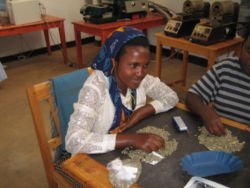
Origins
Rwandans have been growing coffee since colonial times, but until 1999 the product was classed below Grade C, making it unsalable on the global markets. The farmers did not have the means to wash and prepare their coffee cherries to specifications in a timely manner. Buyers paid US$United States dollar
The United States dollar , also referred to as the American dollar, is the official currency of the United States of America. It is divided into 100 smaller units called cents or pennies....
0.33 per kilogram, a price that kept the farmers poor.
In 1999, 220 coffee growers formed an association in the Maraba district (part of the former Butare Province
Butare Province
Butare was a province of Rwanda prior to its dissolution in January 2006. Butare city is the second largest city in Rwanda and one of the nation's former twelve provinces. It is located in south-central region of the country and borders Burundi to the south...
) to tackle this problem. Many of these farmers had lost family members during the 1994 genocide, while others had husbands in prison, accused of participating in the killings and due to face trial in the traditional gacaca court
Gacaca court
The Gacaca court is part of a system of community justice inspired by tradition and established in 2001 in Rwanda, in the wake of the 1994 Rwandan Genocide, when between 800,000 and 1,000,000 Rwandans, mostly Tutsi, were slaughtered...
s. They named the association Abahuzamugambi, a Kinyarwanda
Kinyarwanda language
Kinyarwanda , is a dialect of the Rwanda-Rundi language spoken by some 12 million people in Rwanda, where it is the official language, and adjacent parts of southern Uganda...
word for people who work together to achieve a goal. The farmers hoped that by forming the association, they would increase revenue by selling directly to exporters in Kigali
Kigali
Kigali, population 965,398 , is the capital and largest city of Rwanda. It is situated near the geographic centre of the nation, and has been the economic, cultural, and transport hub of Rwanda since it became capital at independence in 1962. The main residence and offices of the President of...
instead of through an intermediary transport company. They divided their profits and used them to buy tools, fertilisers and seeds to increase yields.
In 2000, the mayor of Maraba requested development aid from the National University of Rwanda
National University of Rwanda
The National University of Rwanda is the largest university in Rwanda. It is located at in the city of Butare and was established in 1963 by the government in cooperation with the Congregation of the Dominicans from the Province of Quebec.When it was established, the NUR had three divisions The...
(UNR), based in nearby Butare
Butare
Butare is a city in the Southern Province of Rwanda and capital of Huye district. It was the capital of the former Butare Province, Rwanda, that was dissolved on January 1, 2006....
; the following year UNR helped found the Partnership for Enhancing Agriculture in Rwanda through Linkages (PEARL). Several entities supported the PEARL project: USAID
United States Agency for International Development
The United States Agency for International Development is the United States federal government agency primarily responsible for administering civilian foreign aid. President John F. Kennedy created USAID in 1961 by executive order to implement development assistance programs in the areas...
, Michigan State University
Michigan State University
Michigan State University is a public research university in East Lansing, Michigan, USA. Founded in 1855, it was the pioneer land-grant institution and served as a model for future land-grant colleges in the United States under the 1862 Morrill Act.MSU pioneered the studies of packaging,...
, Texas A&M University
Texas A&M University
Texas A&M University is a coeducational public research university located in College Station, Texas . It is the flagship institution of the Texas A&M University System. The sixth-largest university in the United States, A&M's enrollment for Fall 2011 was over 50,000 for the first time in school...
and various Rwandan bodies including UNR, the national agricultural research institute (ISAR) and the Kigali Institute of Science, Technology and Management (KIST). PEARL started working with Abahuzamugambi in February 2001 to improve the coffee quality to standards required by the specialty coffee market in the United States.
The coffee farmers of Maraba first needed a washing station to remove sugar
Sugar
Sugar is a class of edible crystalline carbohydrates, mainly sucrose, lactose, and fructose, characterized by a sweet flavor.Sucrose in its refined form primarily comes from sugar cane and sugar beet...
from the coating of the coffee bean, under the skin. If this sugar is not removed within 12 hours of picking, the flavour of the coffee is impaired. They built the first station in July 2001 in the Cyarumbo sector, close to the main road, with funding from UNR, the Office des Cultures Industrielles du Rwanda (OCIR-Café), ACDI/VOCA
ACDI/VOCA
ACDI/VOCA is a private, international development nonprofit organization based in Washington, D.C, United States...
, and the Institut des Sciences Agronomiques du Rwanda (ISAR). The opening was late in the harvest season, so only 200 kilograms (441 lb) of that year's harvest were suitable for washing. However, the results were reasonably good, and the station was upgraded to allow more coffee to be processed in 2002. To bring mineral water from Mount Huye
Mount Huye
Mount Huye is a mountain located near to the city of Butare in southern Rwanda. It is connected by a ridge to Nyungwe Forest to the west, and is on the outer edges of the Albertine branch of the Great Rift Valley...
to the upgraded station, ACDI/VOCA helped fund a pipeline, which opened in March 2002.
A new certification system was introduced for the 2002 harvest to ensure that beans brought to the station were of suitable quality. Around half of the Abahuzamugambi membership attained the certification, which allowed the cooperative to look for serious buyers in the specialty markets of Europe and North America.
International acceptance
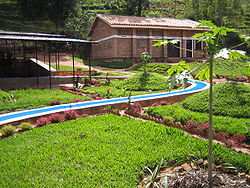
Partnership for Enhancing Agriculture in Rwanda through Linkages
The Partnership for Enhancing Agriculture in Rwanda through Linkages is a project to promote agricultural improvement in Rwanda....
brought a specialty coffee expert to Rwanda, who put them in touch with a seller, Louisiana
Louisiana
Louisiana is a state located in the southern region of the United States of America. Its capital is Baton Rouge and largest city is New Orleans. Louisiana is the only state in the U.S. with political subdivisions termed parishes, which are local governments equivalent to counties...
-based Community Coffee
Community Coffee
Community Coffee is a coffee roasting and retail company based in Baton Rouge, Louisiana, US. Founded in 1919, Community Coffee is the largest family-owned coffee company in America. Community Coffee uses 100% Arabica coffee beans. The company has developed partnerships with coffee growers in South...
, to help market Maraba. They sent samples to Louisiana, and in June 2002 a representative from Community visited Maraba. Rwandan president Paul Kagame
Paul Kagame
Paul Kagame is the sixth and current President of the Republic of Rwanda. He rose to prominence as the leader of the Rwandan Patriotic Front , whose victory over the incumbent government in July 1994 effectively ended the Rwandan genocide...
was also present, as the government placed great importance on the project. Community purchased an 18,000 kilogram (40,000 lb) container of Maraba beans at the above-average rate of US$3 per kilogram. The beans were transported to Louisiana, where they were roasted
Coffee roasting
Roasting coffee transforms the chemical and physical properties of green coffee beans into roasted coffee products. The roasting process is what produces the characteristic flavor of coffee by causing the green coffee beans to expand and to change in color, taste, smell, and density...
and blended into one of the company's gourmet coffees. This was the first direct contract between an American roaster and an African coffee cooperative.
Comic Relief also took an interest in Maraba. The 2001 Red Nose Day campaign had brought in £
Pound sterling
The pound sterling , commonly called the pound, is the official currency of the United Kingdom, its Crown Dependencies and the British Overseas Territories of South Georgia and the South Sandwich Islands, British Antarctic Territory and Tristan da Cunha. It is subdivided into 100 pence...
55 million for projects in the UK and Africa, some of which they pledged to the Association des Veuves du Genocide
Association des Veuves du Genocide
Association des Veuves du Genocide or the Association of the Widows of Genocide is a Rwandan association formed to help widows, orphans and others who lost family members in the 1994 Rwandan genocide...
(AVEGA), an association of widows of the 1994 Rwandan Genocide
Rwandan Genocide
The Rwandan Genocide was the 1994 mass murder of an estimated 800,000 people in the small East African nation of Rwanda. Over the course of approximately 100 days through mid-July, over 500,000 people were killed, according to a Human Rights Watch estimate...
. The charity discovered that many of the Maraba smallholders were also members of AVEGA and could thus provide funding and support. They contacted Union Coffee Roasters (UCR), a British roasting company, whose representatives visited Maraba in 2002 with officials from the Fairtrade Labelling Organisation
Fairtrade Labelling Organizations International
Fairtrade International was established in 1997, and is an association of 3 producer networks, 19 national labelling initiatives and 3 marketing organizations that promote and market the Fairtrade Certification Mark in their countries Fairtrade labelling organizations exist in 18 European...
(FLO). This group inspected the Maraba site and granted certification, making Maraba coffee the first Rwandan cooperative to gain Fairtrade status. UCR described the coffee as containing "sparkling citrus
Citrus
Citrus is a common term and genus of flowering plants in the rue family, Rutaceae. Citrus is believed to have originated in the part of Southeast Asia bordered by Northeastern India, Myanmar and the Yunnan province of China...
flavours complemented by deep, sweet chocolate
Chocolate
Chocolate is a raw or processed food produced from the seed of the tropical Theobroma cacao tree. Cacao has been cultivated for at least three millennia in Mexico, Central and South America. Its earliest documented use is around 1100 BC...
notes" and bought all the remaining produce from the 2002 harvest.
UCR distributed its Maraba Coffee in early 2003 via Sainsbury's supermarket
Supermarket
A supermarket, a form of grocery store, is a self-service store offering a wide variety of food and household merchandise, organized into departments...
s, which sold the product in all 350 of its stores in the run up to that year's Red Nose Day. In 2003, the Abahuzamugambi Cooperative made US$35,000 in net profits. Of this, 70% was divided among the farmers at US$0.75 per kilogram provided, an amount more than three times that paid to other coffee growers in Rwanda and sufficient to pay for health care and education services which were not previously affordable. The remaining 30% was invested back into the cooperative and spent on buying calcium carbonate
Calcium carbonate
Calcium carbonate is a chemical compound with the formula CaCO3. It is a common substance found in rocks in all parts of the world, and is the main component of shells of marine organisms, snails, coal balls, pearls, and eggshells. Calcium carbonate is the active ingredient in agricultural lime,...
, an agricultural lime
Agricultural lime
Agricultural lime, also called aglime, agricultural limestone, garden lime or liming, is a soil additive made from pulverized limestone or chalk. The primary active component is calcium carbonate...
used to reduce acid
Acid
An acid is a substance which reacts with a base. Commonly, acids can be identified as tasting sour, reacting with metals such as calcium, and bases like sodium carbonate. Aqueous acids have a pH of less than 7, where an acid of lower pH is typically stronger, and turn blue litmus paper red...
ity in the soil caused by run off of minerals during rainfall.
Recent years: independence and coffee beer
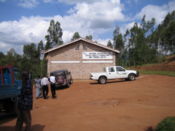
Butare
Butare is a city in the Southern Province of Rwanda and capital of Huye district. It was the capital of the former Butare Province, Rwanda, that was dissolved on January 1, 2006....
.
In late 2004, London-based Meantime Brewing
Meantime Brewing
Meantime Brewery is an award-winning brewery based in Greenwich, London, England.-History:It was founded in 2000 by Brewmaster, Alastair Hook, who trained at the world famous brewing school at the Technical University of Munich of Weihenstephan...
began offering a coffee beer
Beer
Beer is the world's most widely consumed andprobably oldest alcoholic beverage; it is the third most popular drink overall, after water and tea. It is produced by the brewing and fermentation of sugars, mainly derived from malted cereal grains, most commonly malted barley and malted wheat...
made out of beans grown in Maraba. The drink is intended as an alcoholic iced cappucino or digestif. The head brewer tasted coffees from around the world but decided that the hints of vanilla
Vanilla
Vanilla is a flavoring derived from orchids of the genus Vanilla, primarily from the Mexican species, Flat-leaved Vanilla . The word vanilla derives from the Spanish word "", little pod...
and chocolate
Chocolate
Chocolate is a raw or processed food produced from the seed of the tropical Theobroma cacao tree. Cacao has been cultivated for at least three millennia in Mexico, Central and South America. Its earliest documented use is around 1100 BC...
in Maraba coffee made it more suitable than the nutty
Nut (fruit)
A nut is a hard-shelled fruit of some plants having an indehiscent seed. While a wide variety of dried seeds and fruits are called nuts in English, only a certain number of them are considered by biologists to be true nuts...
and bitter coffees from South America. The original beer had an alcohol content
Alcohol by volume
Alcohol by volume is a standard measure of how much alcohol is contained in an alcoholic beverage .The ABV standard is used worldwide....
of 4% and the same caffeine
Caffeine
Caffeine is a bitter, white crystalline xanthine alkaloid that acts as a stimulant drug. Caffeine is found in varying quantities in the seeds, leaves, and fruit of some plants, where it acts as a natural pesticide that paralyzes and kills certain insects feeding on the plants...
content as coffee, and was described as having a "silky, velvety character". It is sold in larger branches of Sainsbury's and in some pubs and clubs. The beverage was one of only two Fairtrade beers available on the UK market until 2006, when a reduction in the proportion of coffee and an increased alcohol content (now 6%) cost it its Fairtrade status. It is still made from Maraba beans. It is the only coffee beer available in the British Isles, and it won the Gold medal for the coffee-flavoured beer category at the 2006 Beer World Cup.
In 2006, the Swedish Minister for Development Co-operation and Deputy Minister for Foreign Affairs
Ministry for Foreign Affairs (Sweden)
The Ministry for Foreign Affairs is responsible for Swedish foreign policy.Current ministers:*Carl Bildt Head of Office and Minister for Foreign Affairs.*Ewa Björling as Minister for Foreign Trade...
, Carin Jamtin
Carin Jämtin
Carin Jämtin is a Swedish Social Democratic politician and the party-Secretary of the Social Democratic Party since 26 March 2011. She was Minister for International Development Cooperation in the Swedish government between 2003 and 2006.-Early career:She has briefly studied at Stockholm...
, visited Maraba to extend cooperation between Sweden and Rwanda and expose Maraba coffee to the Swedish specialty market. In July 2006, a telecentre
Telecentre
A telecentre is a public place where people can access computers, the Internet, and other digital technologies that enable them to gather information, create, learn, and communicate with others while they develop essential digital skills...
was opened in Maraba under the coordination of PEARL. USAID, NUR and Washington State University
Washington State University
Washington State University is a public research university based in Pullman, Washington, in the Palouse region of the Pacific Northwest. Founded in 1890, WSU is the state's original and largest land-grant university...
(WSU) Extension's Center to Bridge the Digital Divide
Center to Bridge the Digital Divide
The Center to Bridge the Digital Divide was a self-sustaining outreach unit of the Washington State University Extension. Founded in 2001, the CBDD was an ICT4D organization committed to assisting under-served populations leverage information communication technologies to better their lives and...
(CBDD) provided funding and resources. Three WSU students spent six weeks in Rwanda helping to set up the centre and train the local staff, who now operate it.
Geography and climate

Butare
Butare is a city in the Southern Province of Rwanda and capital of Huye district. It was the capital of the former Butare Province, Rwanda, that was dissolved on January 1, 2006....
and 150 kilometres (93 mi) from the capital, Kigali
Kigali
Kigali, population 965,398 , is the capital and largest city of Rwanda. It is situated near the geographic centre of the nation, and has been the economic, cultural, and transport hub of Rwanda since it became capital at independence in 1962. The main residence and offices of the President of...
. The project began in the Maraba District of Butare Province
Butare Province
Butare was a province of Rwanda prior to its dissolution in January 2006. Butare city is the second largest city in Rwanda and one of the nation's former twelve provinces. It is located in south-central region of the country and borders Burundi to the south...
, but these entities were replaced under local government organisation in 2006, and the area is now part of Huye District in the Southern Province. The area is very hilly, due to its proximity to the Western Rift Valley and the montane Nyungwe Forest
Nyungwe Forest
Nyungwe Forest National Park is a national park in southwestern Rwanda, located south of Lake Kivu on the border with Burundi. The park was established in 2004 and covers an area of approximately 970 km² of rainforest, bamboo, grassland, swamps, and bogs. The nearest town is Cyangugu, 54 km to the...
, and features rich volcanic soils. The coffee is grown at altitudes between 1,700 and 2,100 metres (5,577–6,889 ft) above sea level, often on steep hillsides with terrace farming
Terrace (agriculture)
Terraces are used in farming to cultivate sloped land. Graduated terrace steps are commonly used to farm on hilly or mountainous terrain. Terraced fields decrease erosion and surface runoff, and are effective for growing crops requiring much water, such as rice...
. The area experiences an average of 115 centimetres (45 in) of rainfall annually. The majority of this falls during the rainy season of March to May, the major coffee harvesting season. The high altitude lowers the temperature slightly to an average of about 20 °C
Celsius
Celsius is a scale and unit of measurement for temperature. It is named after the Swedish astronomer Anders Celsius , who developed a similar temperature scale two years before his death...
(68 °F
Fahrenheit
Fahrenheit is the temperature scale proposed in 1724 by, and named after, the German physicist Daniel Gabriel Fahrenheit . Within this scale, the freezing of water into ice is defined at 32 degrees, while the boiling point of water is defined to be 212 degrees...
). There is little seasonal variation.
Production cycle
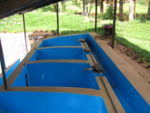
The technicians start the washing process immediately, since delay can cause fermentation
Fermentation (food)
Fermentation in food processing typically is the conversion of carbohydrates to alcohols and carbon dioxide or organic acids using yeasts, bacteria, or a combination thereof, under anaerobic conditions. Fermentation in simple terms is the chemical conversion of sugars into ethanol...
of the sugary coating surrounding the bean and ruination of the coffee flavour. The beans are first thrown into a deep tank. The best cherries sink to the bottom and pass through a machine that removes their skin. The technicians remove any floating cherries and process them in the same way as the others for the cooperative to sell on the domestic market for less than specialty-coffee price. The beans are fed through one of the cooperative's three de-skinning and selection machines to remove their skins and most of the sugary coating before running the individual beans through a vibrating colander
Colander
A colander is a bowl-shaped kitchen utensil with holes in it used for draining food such as pasta or rice.The perforated nature of the colander allows liquid to drain through while retaining the solids inside...
. The colander separates the very highest quality Grade A beans from those labeled Grade B; the two grades are sent separately down the hill in a water chute with a 1% gradient. This process allows for further separation of beans based on quality, with around 15 tanks available at the bottom for capture of the different types. The beans are kept submerged, two days for the best and 15–20 hours for the lesser beans, which causes a small amount of fermentation to convert the remainder of the sugar without significantly impairing the flavour.
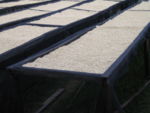
The technicians then move the beans to the technical centre in nearby Kizi. Certain machines, housed in a warehouse up the side of the hill, remove the parchment skins from the beans. Employees take the beans into the adjacent laboratory for the final quality control process – hand sorting – which is carried out by several experienced women. The beans are bagged and labeled according to their quality, and stored in the compound's warehouse to await sale.
Products and customers
As of 2006, Maraba produces 80 short tonShort ton
The short ton is a unit of mass equal to . In the United States it is often called simply ton without distinguishing it from the metric ton or the long ton ; rather, the other two are specifically noted. There are, however, some U.S...
s (73,000 kg) of export-quality coffee per year, of which 40 tons go to roasters and sellers in the United Kingdom and 40 tons to the United States.
The coffee appears in the following products:
- Maraba Bourbon coffee, produced by Union Coffee for Sainsbury's and other UK-based outlets.
- "New Orleans Jazz" Blend and Hotel blend, two Community Coffee brands containing a blend of Maraba and other coffees. As of 2006, Community are considering launching Maraba as a single origin brand.
- Café de Maraba, the brand produced by Rwanda Roasters and sold in upmarket shops in Rwanda, including all TotalTotal S.A.Total S.A. is a French multinational oil company and one of the six "Supermajor" oil companies in the world.Its businesses cover the entire oil and gas chain, from crude oil and natural gas exploration and production to power generation, transportation, refining, petroleum product marketing, and...
petrol stations and the Intercontinental Hotel. It is the most expensive coffee generally available in the country. - Meantime Coffee, the beer produced by Meantime Breweries of London.
- Intelligentsia have used the coffee in various blends in 2005, due to their shipment arriving late, but intends also to launch it as a single-origin brand in the future.
See also
- Economics of coffeeEconomics of coffeeCoffee is an important commodity and a popular beverage. Over 2.25 billion cups of coffee are consumed in the world every day. Over 90% of coffee production takes place in developing countries, while consumption happens mainly in the industrialized economies. Worldwide, 25 million small producers...
- History of coffeeHistory of coffeeThe history of coffee goes at least as far back as the thirteenth century. The Kefficho People who were the first to discover and recognize the energizing effect of the coffee bean plant. The story of Kaldi, the 9th-century Ethiopian goatherd who discovered coffee, did not appear in writing until...
- International Fairtrade Certification MarkInternational Fairtrade Certification MarkThe International FAIRTRADE Certification Mark is an independent certification mark used in over 50 countries. It appears on products as an independent guarantee that disadvantaged producers in the developing world are getting a better deal....
- Kuapa KokooKuapa KokooKuapa Kokoo is a cocoa farmers' cooperative organisation, established in Ghana in 1993. It was formed following the Ghanaian government's liberalisation of internal cocoa marketing in 1992, which, farmers feared, would lead to the entry of private companies into the market with whom they would be...
External links
- Coffee, Fairtrade & Rwanda Booklet
- Partnership for Enhancing Agriculture in Rwanda through Linkages (PEARL)
- The Abahuzamugambi Coffee Cooperative (pearl.org.rw)
- Profile of the Abahuzamugambi Coffee Farmers' Co-operative, Rwanda (fairtrade.org.uk)
- The Abahuzamugambi Co-operative, Rwanda (peopleandplanet.org)

